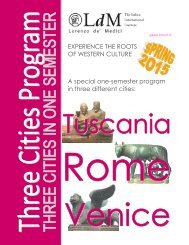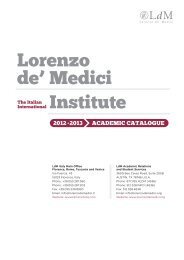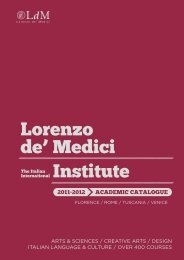aCademiC Catalog 2013-2014 - Lorenzo de Medici
aCademiC Catalog 2013-2014 - Lorenzo de Medici
aCademiC Catalog 2013-2014 - Lorenzo de Medici
Create successful ePaper yourself
Turn your PDF publications into a flip-book with our unique Google optimized e-Paper software.
School of Arts & Sciences ROME<br />
and the peculiar characteristics of European integration. The<br />
course is organized in three parts. First, it reviews the i<strong>de</strong>as,<br />
events, and actors that led to the foundation of the European<br />
Coal and Steel Community (ECSC) and the European Economic<br />
Community (EEC) and to its enlargement from 6 to 27 countries.<br />
Second, the course takes an in-<strong>de</strong>pth look at EU institutions and<br />
policies, casting a critical eye on the crucial period from 1985<br />
to 1993 that led to the acceleration of European integration<br />
through the Single European Act, further enlargements, and<br />
the Maastricht Treaty. Finally, the course reflects on three major<br />
questions facing the EU in the new millennium: What is the EU<br />
as a political subject? What is its purpose? What should be<br />
its role in a global world? To explore the resonances of these<br />
questions the course consi<strong>de</strong>rs practical policy dilemmas that<br />
the EU faces in various fields such as economic and monetary<br />
policy, regulatory and distributive questions, the <strong>de</strong>mocratic<br />
<strong>de</strong>ficit, the challenge of enlargement to the East, the Lisbon<br />
Treaty, and common foreign and security policy.<br />
Prerequisites: POL 288 International Politics, or equivalent<br />
International Rome: a UN City<br />
POL 328 R<br />
Cr: 3; Contact hrs: 45<br />
Treating the United Nations in Rome as a case study, this<br />
course explores the purposes, background, and operations of<br />
international organizations in an age of globalization, the major<br />
challenges they face at the international level, and the responses<br />
to them of the international community. Studying in Rome<br />
will allow stu<strong>de</strong>nts to integrate class learning with first hand<br />
experience of the UN, participating in conferences, meeting<br />
UN officials and diplomats and accessing key UN information.<br />
Stu<strong>de</strong>nts will discover the policies un<strong>de</strong>rtaken by the United<br />
Nations and the way they are implemented. The course will<br />
survey the UN organizations in Rome: FAO, WFP and IFAD.<br />
Stu<strong>de</strong>nts will familiarize themselves with the <strong>de</strong>velopment<br />
priorities of these organizations. They will analyze their work<br />
and prepare project drafts that address their assigned issues<br />
and goals. Through research, meetings and <strong>de</strong>bate, stu<strong>de</strong>nts<br />
will i<strong>de</strong>ntify strengths and problems of these organizations<br />
and <strong>de</strong>velop solutions by evaluating probable consequences of<br />
proposed actions.<br />
Interest Representation and Lobbying in the<br />
European Union<br />
POL 332 R<br />
Cr: 3; Contact hrs: 45<br />
This course introduces stu<strong>de</strong>nts to the system of interest<br />
representation and lobbying at the European Union (EU) level.<br />
The course will examine the structure and the functioning<br />
of the system of interest representation and explain its<br />
<strong>de</strong>velopment in the EU. After a long process of European<br />
integration, which has been mainly a process of <strong>de</strong>legation<br />
of much public policy to the European Union, interest groups<br />
have retargeted their strategies, and adapted them to the<br />
new political situation. The variety of interests with a stake in<br />
European public affairs is vast. It inclu<strong>de</strong>s firms, associations,<br />
fe<strong>de</strong>rations and non-governmental organizations. There are<br />
1,450 formally constituted EU level groups of all types. Over<br />
250 firms have direct representation in Brussels, with, in<br />
addition, approximately 140 lobbying consultancy firms and<br />
120 law firms. First the course will <strong>de</strong>scribe the characteristics<br />
of the EU policy-making that encourage the establishment of<br />
many private interests in the EU arena. Then the course will<br />
<strong>de</strong>scribe the different types of players who try to influence<br />
EU policy-making. The second part of the module focuses on<br />
the concept of lobbying as it is perceived in Brussels and its<br />
real nature. The resources nee<strong>de</strong>d for being effective at the EU<br />
level are <strong>de</strong>scribed. The course will conclu<strong>de</strong> by addressing the<br />
relationship between lobbying, pluralism and <strong>de</strong>mocracy.<br />
Prerequisites: POL 236 Mo<strong>de</strong>rn European Politics, or equivalent<br />
Psychology<br />
Introduction to Psychology<br />
PSY 150 R<br />
Cr: 3; Contact hrs: 45<br />
This course introduces stu<strong>de</strong>nts to the major areas of psychology<br />
through current empirical research and theoretical <strong>de</strong>bate.<br />
Scientific and non-scientific approaches to the explanation<br />
of psychological phenomena are examined critically. Topics<br />
inclu<strong>de</strong>: anthropological assumptions and implications,<br />
<strong>de</strong>ontology, sensation and perception, cognitive processes,<br />
consciousness, language, learning, personality, <strong>de</strong>velopment<br />
and psychopathology. Stu<strong>de</strong>nts will be introduced to the main<br />
theories for each of these topics from different perspectives<br />
(e.g. biological, behavioral, cognitive, and psychodynamic).<br />
Stu<strong>de</strong>nts will also look at the different types of scientific<br />
research (e.g. experiments, correlational research, review, metaanalysis),<br />
and will analyze the typical structure of a research<br />
paper (introduction, method, results, discussion, limitations<br />
and implications).<br />
Social Psychology<br />
PSY 200 R<br />
Cr: 3; Contact hrs: 45<br />
This course is about the study of human social behavior,<br />
examining theories, findings and methods of social psychology,<br />
viewed from an interpersonal perspective. What is the essential<br />
nature of our personality, and what impact do social groups<br />
(whether that group is the family, school, or society) have on<br />
our <strong>de</strong>velopment and everyday behavior? Topics inclu<strong>de</strong>: social<br />
cognition, the role of others in shaping self-concepts, as well<br />
as the formation of person perception, attitu<strong>de</strong>s, attribution<br />
theory, obedience, conformity, interpersonal attraction, and<br />
social relations. We will look at the causes and methods<br />
of reducing prejudice and aggression, as well as exploring<br />
altruism, the <strong>de</strong>velopment of gen<strong>de</strong>r roles, stereotypes, nonverbal<br />
behavior, and social influence. Stu<strong>de</strong>nts will acquire<br />
a new framework for interpreting social behavior. Among<br />
the topics explored in the course are socialization, language<br />
acquisition, interpersonal behavior, and persuasion. Stu<strong>de</strong>nts<br />
will also have the opportunity to <strong>de</strong>velop the ability to analyze<br />
their own and others’ behavior. In addition, since this course<br />
is taught in Florence, Italy, it provi<strong>de</strong>s a natural opportunity to<br />
compare and contrast the influence of culture on individuals.<br />
Living even for a short period in another country helps you to<br />
see and un<strong>de</strong>rstand the relationship between the individual<br />
(self) and society.<br />
Prerequisites: PSY 150 Introduction to Psychology, or equivalent<br />
Film: The Spectator’s Experience<br />
PSY 274 R; Dual listed: MCT 274 R<br />
Cr: 3; Contact hrs: 45<br />
This course approaches film from the point of view of the<br />
spectator, that is to say an individual’s emotions, thought<br />
processes, and psychology. The course seeks answers to such<br />
natural questions as: how does the mind actually manage film<br />
images and sounds?; what takes place when we are moved to<br />
sympathize with a screen character, even a “villain”?; what is<br />
implied psychologically in the physical situation of watching<br />
a movie? The point of <strong>de</strong>parture is a general consi<strong>de</strong>ration<br />
of the way the human mind processes visual information,<br />
and how it engages with media and mass media. Seeking to<br />
isolate what is special about the film experience, stu<strong>de</strong>nts<br />
explore psychological mechanisms and situations that may<br />
come into play before the cinema screen, including role<br />
mo<strong>de</strong>ls and i<strong>de</strong>ntification, curiosity, and voyeurism. The course<br />
builds stu<strong>de</strong>nt awareness that our reactions and responses to<br />
film obey certain structures, and that in or<strong>de</strong>r to reach their<br />
objectives scriptwriters, editors and directors manipulate those<br />
structures. The class format inclu<strong>de</strong>s gui<strong>de</strong>d screening of<br />
movies and sequences and discussions.<br />
Introduction to Art Therapy<br />
PSY 285 R; Dual listed: PDM 285 R<br />
Cr: 3; Contact hrs: 60<br />
At a time when concepts of education were being re<strong>de</strong>fined<br />
in the late 1400s, Leonardo da Vinci recommen<strong>de</strong>d that in<br />
addition to reading, writing and arithmetic, all stu<strong>de</strong>nts be<br />
taught to draw. He was ignored, to the misfortune of later<br />
stu<strong>de</strong>nts. This course is an introduction to the vast area of the<br />
therapeutic possibilities of art and specifically of drawing. The<br />
course intends to transmit the experience of an artist to all<br />
stu<strong>de</strong>nts. Stu<strong>de</strong>nts learn that drawing is a perceptive attitu<strong>de</strong><br />
using all the senses, and <strong>de</strong>pendant upon intuition and intellect.<br />
144<br />
LdM Aca<strong>de</strong>mic <strong>Catalog</strong> <strong>2013</strong>-<strong>2014</strong>





